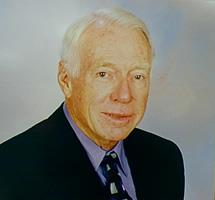- Crone Middle
- School Name
About Our School
Page Navigation
-

Clifford Crone
became an educator because he loved to read. "It was my avocation," he recalled recently. "My father was an avid reader, and I learned that it was fun to experience through books what I could not experience in reality."
Dr. Crone grew up on a farm in Northern Illinois during the Depression. He played in twenty-three acres of woods, property he now owns and uses for his forestry hobby. "My first memories are of attending a one-room school and the education I received there."
Clifford Crone graduated with just twenty-one other students in his Orangeville, Illinois High School class. He went on to Carthage College which was then located in Carthage, Illinois. He majored in English and minored in Spanish, and his first job was teaching in Silver Spring School in Dakota, Illinois. His predecessor, he recalls, had been "run out" by the twenty students in the eight grades of the one-room school.
"That one-room school was the best place in the world to see a child progress from someone who could not read, write or hold a pencil," Dr. Crone recalled. "We were just like a family. I was the teacher, custodian and playmate for twenty-seven boys and girls. The older ones helped the others, and everyone had a good time learning."
"I knew from then on, I would always be an educator."
After two years in the U.S. Army, Dr. Crone returned to his hometown of Cedarville, Illinois, where he was principal of the four-teacher elementary school. He also taught English, math, science and social studies to seventh and eight graders and coached basketball and softball. Additional, he answered the community's expectation of being a volunteer fireman.
Dr. Crone's responsibilities increased in Freeport, Illinois, where he taught junior high English and eventually became a full-time administrator. First, he was supervisor of rural schools and transportation. Later, he became assistant superintendent for curriculum and instruction. He earned his doctorate at the University of Colorado in 1967 and that same year became superintendent of schools in Jacksonville, Illinois. There Dr. Crone spent eight successful years before becoming superintendent in Indian Prairie District 204 in 1975.
In the next eleven years, Dr. Crone faced the many challenges of forging a unit school district from the three small rural elementary districts that had been place just a few years earlier. He became well known for implementing innovation. He fashioned a unit instructional program and extracurricular activities that emcompassed the newly opened high school. He instituted a staff development program and implemented a district-wide parent advisory council.
When District 204 negotiated with an architect to design Clow Elementary School and Thayer J. Hill Middle School, Dr. Crone insisted that the district own the plans to both schools, a very uncommon arrangement. Elementary and middle schools built since that time have been based on those plans. In light of the district's extraordinary growth, this move has saved district taxpayers hundreds of thousands of dollars.
Dr. Crone's eleven years of innovation came despite a property tax roll-back that led to a disastrous reduction in revenue for the district. But Clifford Crone's decisions were always made with an eye to providing the best possible education for all the children of Indian Prairie schools. He crafted a model of excellence and created an atmosphere for students and staff to learn.
"Education is the lifelong process of human development," Dr. Crone said recently. "Life never stays the same. The only place that is static is a museum, and we have to avoid becoming human museums. Education and learning allow us to do that, and in District 204 learning comes first."

